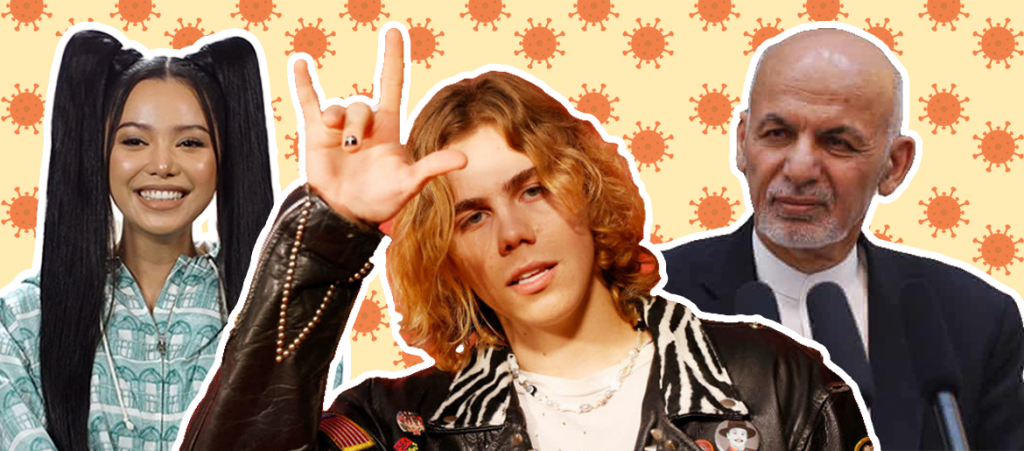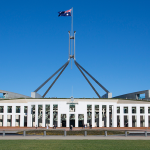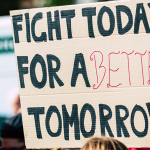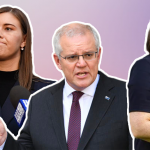
This year has been a lot, to say the least. There were the highest of highs – All Too Well (10 Minute Version) (Taylor’s Version) – and some long-ass lows – Coronavirus (Delta’s Version). It was also the first full year of business for Zee Feed, so that’s something? Before we dive into the new year, we’re taking a look back at the most influential news moments of 2021 – the stories and the people that shaped them. More than a few of these will turn out to be pivotal moments in history. Reflecting is a way to remind ourselves that history doesn’t just happen, it’s created by us. We’re doing it, our actions now are creating the future. So what type of foundation did we lay for 2022 and beyond?
In chronological order, these are the 12 most influential moments we think defined 2021 and will be remembered for a long time. What would you add to the list?
1. Brittany Higgins’ Brave Public Allegations
In February, former Liberal staffer Brittany Higgins shocked the country when she revealed that her colleague Bruce Lehrmann allegedly raped her in Linda Reynolds office in March 2019. Her bravery in coming forward sparked four different investigations into the misogynistic culture at Parliament House, and inspired a shockingly long list of other women to come forward with stories of bullying, harassment and assault at the hands of Australian politicians.
Despite happening at the beginning of the year, this single story shaped how Parliament and the Coalition have been viewed all year long (polling results from women tell the story). It made many around the country realise: if politicians won’t treat their own with respect, how do we expect them to treat us?
2. Facebook Bans Australian News
Also in February, Facebook tried to play hardball with the Australian Government and blocked all news publications from the platform. They pulled the stunt over proposed legislation trying to correct the power imbalance between the tech company and Australian media outlets.
While a lot of Zee Feed followers agreed their feeds was less toxic with the likes of Sky News blocked, the incident was a preview of what the Facebook Papers would reveal later in the year: that big tech controls more of your life, what information you receive, and how you see the world, than it might seem. Whether the Government will succeed in making Meta responsible for the chaos it creates remains to be seen…
3. #IBelieveKate: The Christian Porter Allegations
Shortly after Higgins’ story was published, the media began reporting on another shocking rape allegation. This time, of a woman who said she was raped in 1988, at age 16, by a man who was now a Cabinet Minister. The woman we know only as Kate, and she died by suicide before a thorough investigation of her claims could be conducted by NSW Police. The Minister outed himself in March: Christian Porter.
Kate impacted Australian politics more than she will ever know – her story and Porter’s response has the entire country reevaluating defamation laws, anonymous political donation laws, and questioning why we don’t have an integrity body that can hold politicians to account.
4. Israel’s Eviction of Palestinians From Sheikh-Jarrah
In May, violence in the Israel-Palestine region once again hit the news, sparked this time by the violent forced removal of Palestinian families from the Sheikh Jarrah residential compound and shocking attacks on Gaza.
Although attacks in Israel and Gaza have been in the news many times before, this time it seemed to cut through more powerfully. Support for Palestine caught fire on social media much the way BLM did in 2020. It also sparked a much bigger conversation about the language we use to describe conflict, amplifying calls for the world to call the Israel governments displacement of Palestinians an apartheid.
5. The Delta Strain
We don’t need to tell you too much about Miss Delta. Just when Australia thought it was out of the COVID woods… she came, she saw and she fucked Sydney and Melbourne right up. The Delta outbreaks this year caused more deaths than in 2020, forever changing the lives of more than 1000 Australian families and counting.
The collective trauma Delta put us through has likely shaped the strong responses to new strains and also pushed vaccine hesitancy way down. Above all, it was a brutal reminder that we need to stay vigilant and flexible with health restrictions (as inconvenient as they may be) until the global vaccination rate is much higher.
6. 2021 IPCC Report
The Intergovernmental Panel on Climate Change released its sixth assessment report on the climate crisis in August, and the news wasn’t great. The main takeaway is that the world will probably hit a 1.5ºC increase in the global average temperature in the next 10 years. Much of the damage caused up to that point is irreversible. But! There is still time to cap global warming at 1.5ºC, and make sure we don’t hit 2ºC warming.
To achieve this important goal, the report calls for rapid, transformational change – primarily achieving net-zero emissions as soon as possible, and definitely by 2050. This year’s report seem to hit harder than previous years, with more coverage and conversation around the UN climate change conference, COP26, than usual. There is still hope!
7. US Withdrawal From Afghanistan
After 20 years of war US forces withdrew from Afghanistan in August, leaving the Taliban to take control of the country. While a lot has changed, many experts say the withdrawal leaves Afghanistan in exactly the same situation it was in pre-US invasion – making the case that war fixes nothing and is not a viable solution for global power struggles in the future. On top of this, Australia only evacuated our own defence members and diplomats from Afghanistan – the government has not yet opened up additional pathways for refugees from a country we helped destabilise.
The withdrawal also signals the end of the Middle East as the biggest global security threat. Now attention has shifted to China and the Asia-Pacific region, where Australia can expect to be even more involved in what happens next.
8. TikTok Hits 1 Billion Users
TikTok has cemented its status as the digital platform of 2021, announcing it has 1 billion monthly active users after only five years in business. By comparison, Facebook, Instagram and Youtube each took eight years to reach this milestone. This makes it of the most-used and one of the fastest-growing social media platforms ever.
But the clock app isn’t just an app anymore either – it is changing culture, behaviour and expectations in fast and surprising ways. Already, every other major digital platform (including IG, YouTube, Pinterest, Twitter and even Snapchat) have changed fundamental parts of their apps to mimic TikTok features. In 2022, short-form video will be the main type of content you consume, whether you use TikTok or not.
9. The Facebook Papers Leak (Enter: Meta)
In October, whistleblower Frances Haugen leaked tens of thousands of internal Facebook documents – aka the Facebook Papers – working with journalists to expose the dangerous inner workings of the tech giant to the world. To attempt to distract from the terrifying expose, Facebook renamed its company Meta and announced they want to own the future digital world (metaverse) that we’ll all live in. It was not a comforting distraction.
The fallout from the Facebook Papers is ongoing, with many countries including Australia and the US looking to restrict the power of Meta and its cartoon villain leader Mark Zuckerberg. This story isn’t over, and whether there is a happy or sad ending for any of us here is still TBC.
“Arguably the biggest bombshell from the #FacebookPapers is that many employees have suggested ways to start fixing the problems… but decision makers have ignored them.”https://t.co/vg6kjaQsVk
— ZEE FEED (@zee_feed) October 26, 2021
10. Britney is Freed!
In November, Britney Spears was officially freed from the conservatorship that controlled her life for nearly 14 years! Spears regains control of her estate and will no longer be required to pay a team of professionals and attorneys to oversee her affairs. In the months leading up to the decision, Spears revealed the extent of conservatorship control for the first time, including being forced to take medication against her will and how tightly her father and conservator Jamie Spears controlled intimate details of her life.
The case sparked widespread scrutiny and re-evaluation of how the media and the public treat young female celebrities. Ultimately, it was Spears’ fans who made this all happen. The fan-driven #FreeBritney movement has been advocating for the star for years – her freedom is proof that there is real power in collective action, pressure and use of media to make a difference
11. NSW Passes Affirmative Consent Laws
Also in November, the NSW Government passed major sexual consent reforms. Under the new affirmative consent legislation, consent to sexual activity must be communicated by words or actions – it cannot be ‘assumed’ by participation. This puts the onus of seeking consent on the accused, making it much easier for survivors of sexual assault to seek justice. It is particularly helpful for those who experience the “freeze” response when assaulted, which prevents them for physically or verbally stopping their attacker.
Victoria is considering a similar proposal, which will also include criminalising the act of ‘stealing’ – removing a condom or other protection without consent from both parties. It’s a huge step forward for correcting the power imbalance, social attitudes, and path to justice for survivors of sexual assault in Australia.
12. Gender-Neutral ARIA Awards
The ARIA Awards had gender-neutral categories for the first time ever. The award show replaced the Best Female Artist and Best Male Artist categories with a non-gendered Best Artist category. In a statement, Annabelle Herd – the body’s first female CEO – declared that “the time for separating artists based on gendered categories that exclude non-binary artists altogether has passed”. This is a step in the right direction towards better representing the nation’s entire music industry, including talented non-binary and gender non-conforming artists like Tash Sultana, Imbi The Girl and G Flip.
Other award shows like the Brit Awards have started to follow suit and will be eliminating gendered categories from next year onwards. Attitudes around award shows in general are shifting, with these moves showing that inclusion and correcting a faux-meritocracy is possible.





Comments are closed.